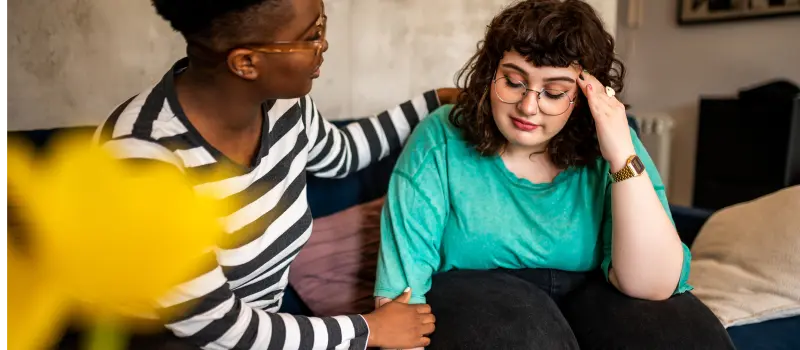
Table of Contents
How Intensive Outpatient Programs Help Teens
Written By: Charlie Health Editorial Team
November 1, 2021
11 min.
Intensive outpatient programs (IOP) can be extremely beneficial for any young adult, especially those who are experiencing critical mental health issues.
Learn more about our Clinical Review Process
Table of Contents
Adolescence is an important period for developing mental, social, and emotional well-being. Throughout their teenage years, adolescents’ brains undergo significant changes, establishing behavioral patterns that will last into adulthood. As a result, existing mental disorders that present during earlier childhood often become more intense during the transition to adolescence. In addition, untreated mental health disorders among adolescents could negatively impact academic performance, interpersonal relationships, and other long-term aspects of their lives.
When teens’ emotions disrupt their ability to function on a day-to-day basis, it might indicate a serious mental health condition that needs attention. In 2019, approximately one in seven adolescents experienced a mental disorder, amounting to 166 million adolescents globally. Moreover, in a 2020 survey, 80% of teens reported experiencing mental health issues during the pandemic.
Every teen is unique, and it’s essential for your teenager to receive the level of care that is right for them. Although weekly therapy and counseling sessions can be extremely beneficial, some teens need a higher level of care to work toward their goals. An intensive outpatient program, combined with an extended treatment team, offers a holistic, multifaceted approach that many teens and families need to start thriving instead of just coping. Here’s how to take action and find your teen the support they need so they can live a healthy, happy life.
Benefits of intensive outpatient programs for teens
If you’re concerned about your teen, it’s important to reach out for professional help as soon as possible. Too often, parents wait too long to seek mental health treatment for their teens. Early intervention can lead to better outcomes for teens and their families, helping teens learn lifelong coping mechanisms and improve their quality of life.
A primary care provider is a great starting point for seeking mental health treatment, but some teens require additional support beyond traditional therapeutic interventions. Intensive outpatient programs (IOPs) can help your teen access the support they need from the comfort of their own home.
Throughout IOP treatment, teenagers can use their coping strategies in real life to navigate their concerns and cope with stressful situations. In addition, research shows that many intensive outpatient programs (IOPs) have a higher success rate than other outpatient approaches. Some of the top benefits of IOPs for adolescents and young adults include:
Preventing isolation and loneliness
Social support, especially parental support, can play a significant role in your teen’s recovery. However, inpatient programs can lead to isolation and loneliness after teenagers are separated from their close friends and family members. In contrast, IOP therapy makes it easy for your teen to access high-quality, comprehensive treatment without leaving home or having to live in a residential treatment facility. Although teenagers need to dedicate a few hours to treatment on a weekly basis, they’ll still be able to hang out with friends, spend time with family members, and maintain their academic commitments. Intensive outpatient programs allow parents to actively participate in their teen’s treatment, providing parents with valuable opportunities to listen to, acknowledge, and validate their teenagers throughout the recovery process.
Meeting new people
Group sessions can provide another important source of support for teens during their treatment. Group sessions are led by a mental health professional, such as a psychologist or counselor, and typically include 5–15 members. During group sessions, teenagers can connect with people in similar situations, share their experiences, and learn healthy coping strategies to navigate life’s challenges. In a group setting, group members can also hold each other accountable and keep your teen motivated throughout their IOP.
Join the Charlie Health Library
Get mental health updates, research, insights, and resources directly to your inbox.
You can unsubscribe anytime.
Privacy and confidentiality
Many teenagers are hesitant to seek mental health treatment because they feel ashamed of or embarrassed by their mental illness. Whether your teen is experiencing substance use problems, depression, or anxiety, remote intensive outpatient treatment offers a more private solution than inpatient treatment while delivering the higher level of care your teen needs. Many IOPs also offer flexible scheduling options, including evening and weekend appointments, so your teenager won't have to miss school or extracurricular activities to attend therapy appointments. This way, your teen won't have to worry about explaining absences to their friends, family members, or teachers. Plus, teens can reach out to their treatment team anytime without going through their parents or visiting a treatment center.
Structured, flexible treatment options
An intensive outpatient program will give your teen the structure they need without interfering with their daily routine. Even if you don't live near a treatment center, remote IOPs make it easy for your teen to connect with expert clinicians, addiction professionals, and mental health providers from the comfort and privacy of home. IOP treatment typically occurs in regularly scheduled sessions, with many outpatient programs including some combination of individual, group, family therapy, and psychiatric support (if needed).
Comprehensive, individualized treatment
Intensive outpatient programs are designed to help even the most vulnerable teenagers, including those who haven't had access to high-quality treatment, access the highest level of care. During your teen's treatment program, they'll be able to work with a team of experienced clinicians to create an individualized treatment plan based on their specific needs and preferences. IOP programs can be especially helpful for teenagers experiencing mental health crises, including substance abuse issues, major depression, and various mood disorders. At Charlie Health, we focus on personalized, evidence-based treatment plans to ensure successful, sustainable healing in a safe home environment.
What can IOP help treat?
Intensive outpatient programs provide comprehensive treatment for a wide range of mental health conditions. These personalized treatment programs include several evidence-based modalities, including group and individual therapy, family therapy and support, plus mindfulness practices, to ensure a successful recovery and provide a high level of care throughout treatment.
At Charlie Health, our experienced, compassionate team of clinicians will work with your teen and family throughout the treatment process to create an individualized treatment plan based on your teen's unique needs, preferences, and experiences. Our IOP program can help treat the following conditions in adolescents and young adults:
- Depressive disorders, including major depression, melancholic depression, atypical depression, and dysthymia.
- Trauma, including post traumatic stress disorder (PTSD), acute stress disorder, and relational trauma.
- Mood disorders, including mood dysregulation, persistent depressive disorder, bipolar disorder, and dissociative identity disorder.
- Self-harm, including suicidal ideation.
- Self-addiction and substance use problems, including alcohol addiction, prescription drug addiction, and drug abuse.
- Behavioral addiction, including sex addiction, codependency, and relationship addiction.
- Technology addiction, including social media addiction and gaming addiction.
- Other disorders, including borderline personality disorder, gender identity issues, and ADHD.
Do you need more support with
your mental health?
Charlie Health can help.
Is intensive outpatient treatment right for your teen?
Intensive outpatient programs are best for adolescents and young adults who experience mental health concerns that disrupt their daily lives. If your teen needs a higher level of care than once-a-week individual therapy sessions offer or they don't meet the necessary criteria for inpatient treatment, an IOP offers a convenient, flexible solution with ongoing support. Some signs that an IOP program might help your teen include:
- Poor academic performance, constantly handing in late assignments, or missing days in school.
- Withdrawing from close friends and family members.
- Losing interest in activities and previously enjoyed hobbies.
- Sleeping problems or poor sleep hygiene, such as insomnia and nightmares.
- Inability to sit still or focus on tasks.
- Fatigue, lack of concentration, or oversleeping.
- Constant mood swings, i.e., shifting low energy and hyperactivity.
- Seeming constantly anxious or worried.
- Engaging in self-harm, such as cutting, picking, or biting.
- Having suicidal thoughts.
- Risky behavior, such as unsafe driving, unprotected sex, or binge drinking.
- Smoking, taking drugs, or drinking.
Although experimenting with drugs or alcohol is not encouraged, it does not necessarily suggest a substance use disorder. With that said, if your teen engages in drug or alcohol use and also engages in the other behaviors listed above, this combination of behaviors indicates a red flag. If you’re concerned about these behaviors in any way or need additional support, it's worth seeking professional help.

Even if your teen doesn't openly express their feelings, it's important to keep an eye on them. Talking about mental health concerns with teenagers can be a touchy subject. Teenagers might not be willing to express their feelings if they don't think that you will greet them with unconditional support. To talk to your teen about their mental health, keep an open, honest line of communication to show your teen that they can talk to you about anything. Often, the best way to start the conversation is to talk about your own experiences.
Remember: Adolescence is a time of transition and change. However, severe and dramatic changes in behavior may be signs of mental health issues. These symptoms don't always indicate a psychiatric diagnosis, such as major depression, but could still signal something going on in their life. Sometimes, all it takes is a simple conversation to help you decide if your teen's behavior warrants individual counseling or a clinical treatment program.
What can you expect during an IOP?
From anxiety disorders to substance use disorders, outpatient programs can help teenagers prioritize their mental wellness and kickstart the healing process. When you're ready to take the first step, contact our Admissions Team at Charlie Health to start the process. Our team is available 24/7 to listen to your needs, answer your questions, and address any concerns you might have.
After you've learned more about our intensive outpatient program, we'll schedule a clinical consultation. During our consultation, we'll learn about your teen's specific needs, preferences, and requirements. Then, we'll work together to build an individualized treatment plan—complete with individual therapy, group sessions, family therapy sessions, and psychiatric support (if needed)—to help your teen work toward their goals.
Based on your teen's initial assessment, we'll assign a primary therapist who specializes in their treatment needs. Your teen's therapist will provide ongoing support during their time with Charlie Health, from admission into our online program to aftercare planning. In addition, your teen will be matched with personalized peer support groups based on their specific challenges.
At Charlie Health, we believe that holistic treatment plans can help your teen carve the path toward sustainable healing. Your teen will be placed in skills-based, experiential, and psychoeducational groups to learn lifelong coping skills. They'll also attend weekly individual and family therapy sessions. Through a multi-disciplinary approach, we'll help your teen shed light on their blind spots. Your teenager needs to dive deep so they can heal from the source, not just from the symptoms.
We prepare every team for sustainable healing from the start, which is why aftercare starts during admission. We work closely with teenagers and family members to give our clients the tools they need to step down to lower levels of care. Ultimately, we'll help your teen become their own therapist so they can build a healthy, fulfilling life.

Understanding adolescent mental health
Your teen's mental well-being matters. When teenagers and young adults are mentally healthy, they function well at home, school, and in society. Mental wellness affects every aspect of your teen's life, from their academic performance to relationships.
Teenagers who are mentally healthy are strong learners in the classroom, have great social skills, and have the tools they need to cope with stressful situations. As a result, they're more likely to experience healthy development as they transition into adulthood.
At the same time, teenagers with positive mental well-being can also feel, manage, and express a wide range of emotions—both positive and negative. Your teenager should feel comfortable talking about their emotions and expressing themselves.
While it's normal for adolescents to have some degree of privacy, they should also be able to open up to parents, family members, and other trusted adults. Your teenager should be able to maintain positive relationships with other people. In addition to their peers, they should have healthy relationships with siblings, parents, and teachers.
Most importantly, positive mental well-being helps your teen cope with change. When your teen practices healthy lifestyle choices, expresses their emotions, and seeks social support, they'll build the resilience needed to cope with stressful situations. It's normal for teens to express some uncertainty when it comes to changes in schedules or routines, but healthy teens can adapt with the help of others. Strong coping mechanisms is an indicator of positive mental health.
Common mental health conditions in teenagers
Without sustainable coping mechanisms, teenagers are more vulnerable to mental health issues. If your teenager can't find healthy outlets to express their emotions, they might start believing that ignoring their emotions is the best way to deal with them. They might feel like nobody takes them seriously or struggle to find the motivation to study. Other times, teenagers might struggle with their mental health because they believe others will think less of them.
Multiple factors can contribute to mental health issues in teens, from emotional abuse to low self-esteem. Some common mental health conditions in adolescence include:
Anxiety disorders
Anxiety disorders, such as social anxiety disorder and generalized anxiety disorder, can impact teenagers at any age. They often involve persistent worrying and excessive fears. For many people, anxiety involves a combination of psychological and physical symptoms, including headaches, stomach aches, and an increased vulnerability to illness.
Attention deficit hyperactivity disorder (ADHD)
Teens with ADHD often experience inattention and hyperactivity. Some teenagers might have a harder time with attention, while others might struggle to sit still. Children commonly develop ADHD around the age of 6, and most diagnoses are made between the ages of 6 and 12.
Eating disorders
Eating disorders often present during the teen years. Although they're more common in girls, eating disorders can also occur in boys or trans/non-binary young people. Your teen might become fixated on losing weight in an attempt to control their life when other things are in flux, or use other restrictive habits around food to cope with another mental health condition.
Mood disorders
Mood disorders are common in adolescents and teens. Many teens with depression experience persistent feelings of sadness, a loss of interest, and low motivation at school. Meanwhile, bipolar disorder may present as shifts between moods, including mania and depression.
Personality disorders
Borderline personality disorder (BPD) is marked by periods of intense emotional stability, unstable relationships, and a fear of abandonment. Teens with BPD are often "on edge" and they may experience confusion over their sense of self.
Mental health conditions aren't a sign of weakness, and they're not your teenager's fault. Your teenager might feel "stuck" and that's completely normal. Intensive outpatient therapy can help your teenager move past those roadblocks, reframe their perspective, and live a healthier life.
Contact Us
If your teen is struggling with their mental health, it's essential to give them the support they deserve. You want to make the best decision for your teenager—and that starts with giving them the highest level of care.
Left unchecked, mental health disorders can be incredibly damaging. To provide a safe, supportive environment at home, parents should keep an eye on their teens to watch out for any signs of mental illness.
At Charlie Health, our accessible, personalized treatment programs are designed to help clients and families meet their goals in a supportive outpatient setting. With our virtual platform, you can connect with an experienced, licensed therapist from the comfort of your own home using your laptop, tablet, or smartphone. Contact us today to learn more about treatment options for your teen.





